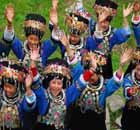Profiles
China's whistleblower doctor, Gui Xi'en
(Xinhua)
Updated: 2009-11-30 15:17
Gui was born to well-educated parents, both US-trained scholars. His father graduated from Princeton University with a doctorate in physics. His half-Chinese, half-Dutch mother graduated from Columbia University. They returned to China in the 1920s.
During the Cultural Revolution, many Chinese with "complicated family backgrounds" or relatives overseas suffered from persecution.
Despite his "problematic" genealogy, he could still go to villages and the pastoral regions and offer medical help to herdsmen. "I was on good terms with local people so I didn't suffer much," he says.
The experience taught Gui that doctors had to work in their communities, rather than wait in clinics for patients, a lesson he passes to his students. "Infectious diseases are not only medical problems, but also social problems. We must reach out to the people in need."
Ploughing On
The same afternoon, Gui meets Cheng Dong and his cousin in Shangcai County Hospital. He reads the girl's medical records and offers advise to resident physicians. He also discusses with Cheng his daughter's schooling.
At about 4 pm, Gui has to leave for Zhumadian City to catch a train back to Wuhan. He apologizes to the families of patients who are still waiting to see him and promises to return.
On the bus to Zhumadian, he looks drawn. "Once I was able to see about 30 to 40 patients on a day like this," he says. "I am really inefficient now."
It's a comment that belies his apparent strong sense of urgency. He describes himself as an "old farm ox", aware that its life is almost at an end and therefore ploughs diligently on.
He quietly recalls a colleague, a year of his senior, who died suddenly a week ago, while eating at a restaurant. Gui attended the funeral the day before he left for Shangcai.
"His family was heartbroken at his sudden death. But I admire him. I think this is a good way to leave, without suffering much and burdening other people," he says.
"To people of my age, this (death) is a natural thing," he says with a slight smile. "That's why I hope I can still do something. I may not have much time left."












